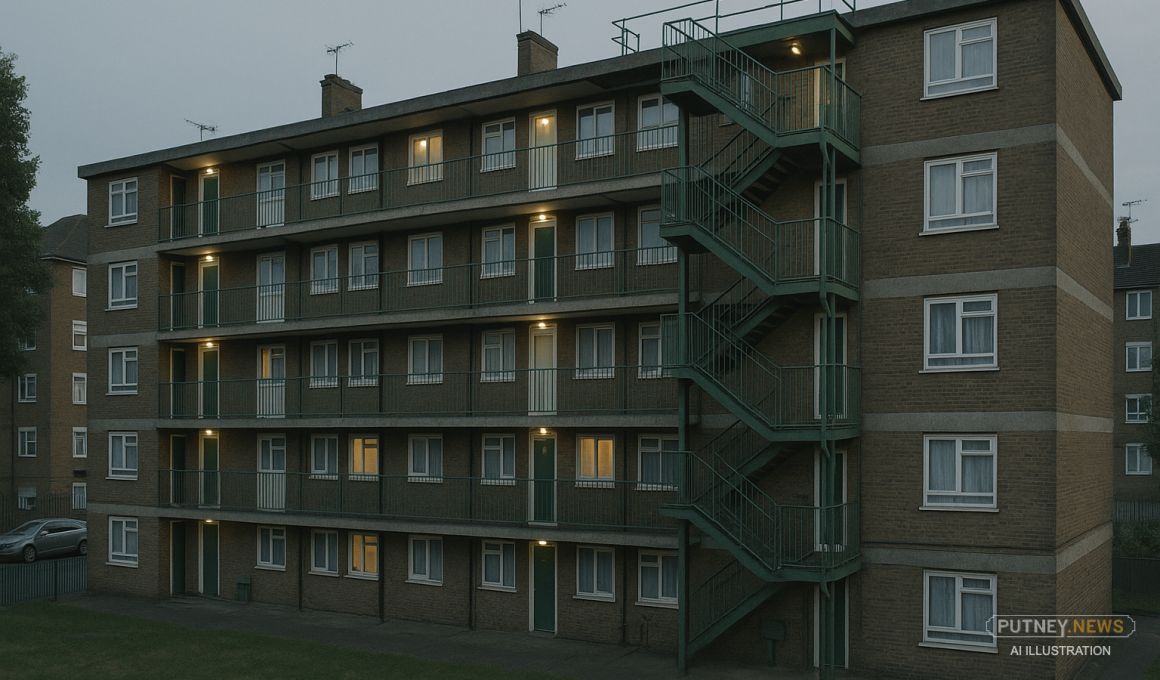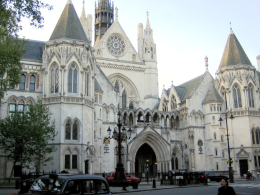Nearly two-thirds of Wandsworth Council housing blocks have failed fire safety tests, with issues dating back years, according to official documents.
Internal auditors randomly tested 25 housing blocks and found 16 – or 64% – had overdue Fire Risk Assessment (FRA) actions that should have been completed long ago to protect residents in the event of a fire. The findings expose the scale of non-compliance despite repeated assurances from Cabinet Member for Housing Aydin Dikerdem that fire safety is being addressed.
When the Regulator issued the C3 rating in February 2025 for “serious failings” involving nearly 1,800 overdue fire safety actions, Cllr Dikerdem described it as “not what we hoped for.”
At an April committee meeting reviewing the rating, councillors were told the backlog had been reduced and that “many of them relate to things like signage, meter boxes, or fire hatch upgrades” – characterising the issues as minor administrative matters.
Yet the audit documents reveal the overdue actions include non-compliant fire doors that should contain flames for 30-60 minutes, blocked fire exits that could trap residents during evacuations, faulty smoke detectors that fail to provide early warning, and missing smoke seals that allow toxic fumes to spread.
The audit shows 299 medium-risk actions remain outstanding for over 12 months, with 11 high-risk actions already overdue this year – evidence that the problems are far more serious than “signage.”
Its results will be scrutinised by councillors tomorrow at a quarterly Audit Committee meeting.
The consequences of failing to complete these actions are stark: blocked fire exits could trap residents in a blaze, faulty smoke detectors could fail to warn families of danger, and non-compliant fire doors could allow fire and toxic smoke to spread between flats instead of containing it.
The risks are not theoretical. In September, a fire at Fox House on Maysoule Road near Clapham Junction destroyed an entire floor and roof, displacing 60 residents. Councillor Kate Stock raised concerns about “why the fire had spread so quickly,” with similar-design blocks remaining occupied nearby.
Why fire risk assessments (FRAs) matter
Fire Risk Assessments are legal safety checks required under the Regulatory Reform (Fire Safety) Order 2005. When fire inspectors identify problems, they create a list of actions the landlord must complete to protect residents.
These aren’t bureaucratic box-ticking exercises – they are life-saving measures. The actions auditors found overdue in Wandsworth include:
- Non-compliant fire doors: Fire doors are designed to hold back flames and toxic smoke for 30-60 minutes, giving residents time to escape. Non-compliant doors can fail within minutes, allowing fire to spread between flats and up stairwells. Fire doors are a legal requirement for flats opening onto communal areas.
- Clearing fire exits and communal areas: Blocked exits trap residents during evacuations. Items stored in corridors and stairwells can fuel fires and produce toxic smoke.
- Smoke detectors and fire alarms: Early warning systems save lives by alerting residents while there’s still time to escape. Faulty or missing detectors mean families could be overcome by smoke while sleeping.
- Smoke seals on door frames: These expand when heated to seal gaps around fire doors, preventing smoke infiltration. Without them, toxic smoke can seep under doors into flats where residents are sheltering.
When these actions remain incomplete for months or years, residents are living with known fire hazards that the council has identified but not fixed.
The scale of outstanding work
The audit documents show actions that originated in different years but remain incomplete as of April 2025:
Overdue actions by year of origin:
- From 2022: 33 medium-risk actions (three years overdue)
- From 2023: 244 medium-risk actions (two years overdue)
- From 2024: 22 medium-risk actions (one year overdue)
- From 2025: 11 high-risk and 39 medium-risk actions already overdue
The 299 medium-risk actions outstanding for over 12 months represents the accumulated backlog from 2022-2024. The 11 high-risk actions are all from 2025 – meaning urgent fire safety issues identified this year are already overdue.
Random sample testing found the problem is widespread: auditors tested 25 blocks and found 16 (64%) had overdue FRA actions. If this failure rate is replicated across the council’s housing portfolio, hundreds of blocks could have unresolved fire safety issues.
The audit classified these delays as a Priority 1 recommendation – the highest risk level – warning that “significant delays in completing medium risk FRA actions can lead to potential fines for the Council and injury to residents.”
A year of failures despite assurances
These findings come despite repeated assurances from Cllr Dikerdem that fire safety is being properly managed. The documents reveal that fire safety compliance problems have persisted for over a year since the Regulator of Social Housing’s intervention in February 2025.
This is not the first time Wandsworth’s fire safety compliance has been flagged. A January 2023 audit examining high-rise blocks found an extraordinary backlog: of 5,471 total tasks on the council’s Riskbase fire safety system, 3,869 were classified as “Very Overdue,” 164 were “Overdue,” and only 1,274 had been completed. Some FRAs dated back to 2016.
The council’s struggles intensified when the Regulator of Social Housing issued a report in February 2025 noting that “all FRA remedial actions were outstanding for more than 12 months” – though crucially, none of the outstanding actions at that time were classified as high-risk.
That regulatory intervention appeared to spur action. Audit documents show the council agreed a plan with the Regulator to reduce outstanding FRA actions, with “regular scrutiny, monitoring and oversight of progress” to demonstrate improvement.
By April 2025, the number of medium-risk actions outstanding for over 12 months had dropped from 508 to 299 – a 41% reduction in three months. However, this still leaves nearly 300 medium-risk actions unresolved for extended periods.
What’s behind the backlog?
Under the Regulatory Reform (Fire Safety) Order 2005, building owners must ensure suitable fire risk assessments are carried out and regularly reviewed. While the Order doesn’t specify fixed intervals, it emphasises regular review of assessments.
The council’s internal audit documents reveal the backlog is concentrated in certain estates, with 28 overdue tasks on one estate alone. A separate 2023/24 audit of Resident Management Organisations (RMOs) and Co-ops found significant overdue tasks. Shockingly, some of these actions have been outstanding since 2016 – nine years ago.
The audit also found that three of six RMOs reviewed did not complete annual reviews of Fire Risk Assessments as required, and four RMOs had non-compliant fire doors in resident and leaseholder properties opening onto communal areas.
Regulatory and legal risks – and real anger to residents
The consequences of these failures extend beyond regulatory penalties. The audit documents warn: “Where FRAs actions are not implemented, there is an increased risk of significant damage to the property, harm/injury or death of residents, prosecution, financial loss and reputational damage to the Council.”
That phrase “harm/injury or death of residents” is not hyperbole – it’s the real risk when fire exits remain blocked, smoke detectors don’t work, and fire doors can’t contain flames.
The Grenfell Tower fire, which killed 72 people in 2017, began with failures in fire safety compliance. While Wandsworth’s issues are categorised as medium-risk rather than the catastrophic failures at Grenfell, the principle is the same: identified fire hazards that aren’t fixed put residents’ lives at risk.
The Regulator of Social Housing has the power to issue enforcement notices, impose fines, and in extreme cases remove properties from a landlord’s control. February’s finding of “serious failings” already puts Wandsworth under heightened scrutiny, and tomorrow’s Audit Committee will want to know why progress has been so slow.
Council response and tomorrow’s scrutiny
The council’s management response to the audit accepts the recommendation for “regular scrutiny, monitoring and oversight of progress to demonstrate the reduction in the number of outstanding FRA remedial actions.”
The deadline for completing this recommendation is 31 December 2025 – just seven weeks away. The responsible officer is listed as the Building Safety Lead.
The Audit Committee will scrutinise these findings at tomorrow’s meeting (Wednesday 12 November, 7:30pm).






